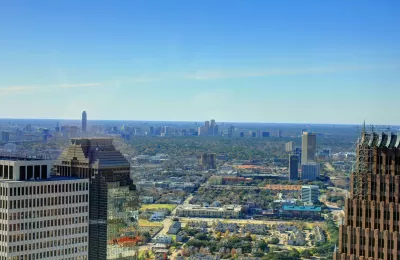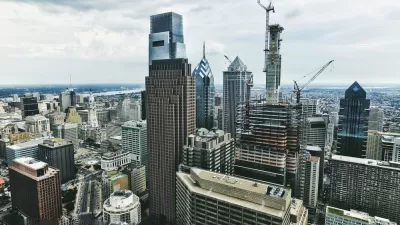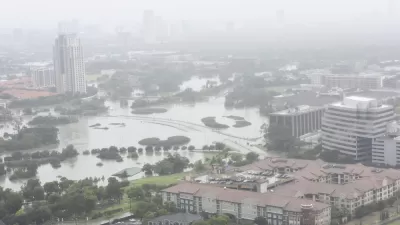The city's unabated growth has made it a bustling hub of industry and commerce, but can it sustain its unmitigated outward sprawl?

Dug Begley takes on Houston's "relentless expansion," arguing that the city's current slate of massive projects "is leaving local leaders straddled between past strategies and unproven alternatives, between more sprawl and urbanization."
Houston's choice, according to Begley, "is how fast it should embrace an end to the old way of doing things and abandon the strategy of additional fringe development that for decades fueled growth" as the region's population growth continues unabated. Critics say the city's outward expansion becomes increasingly unsustainable in the face of the growing threats of climate change and natural disasters. But others worry that reining in sprawl will also lead to a sharp rise in real estate prices and less affordable housing for local families.
"Historically, Houston always has said yes to bigger projects: Wider freeways, larger detention ponds, bigger water pipes." And while recent debates over projects such as the expansion of I-45 signal a shift in thinking, it may not be enough. "Currently, the Houston-Galveston Area Council — the local planning agency that doles out federal money — has projects to continue building the Grand Parkway around the metro region, widen or expand nearly every existing freeway and build a new highway through Brazoria and Fort Bend counties on its books, along with various transit and bicycling projects." Some local leaders, such as Houston Mayor Sylvester Turner, want more incentives for public transit funding built into the infrastructure bill. Turner "has called for a 'paradigm shift' in local transportation" and said "the infrastructure bill needs stronger provisions to encourage local officials to tee up projects that meet climate goals."
FULL STORY: Houston became 'the blob that ate East Texas' by building big. Is it time for that to change?

Montreal Mall to Become 6,000 Housing Units
Place Versailles will be transformed into a mixed-use complex over the next 25 years.

Planetizen Federal Action Tracker
A weekly monitor of how Trump’s orders and actions are impacting planners and planning in America.

DARTSpace Platform Streamlines Dallas TOD Application Process
The Dallas transit agency hopes a shorter permitting timeline will boost transit-oriented development around rail stations.

Study: 4% of Truckers Lack a Valid Commercial License
Over 56% of inspected trucks had other violations.

Chicago Judge Orders Thousands of Accessible Ped Signals
Only 3% of the city's crossing signals are currently accessible to blind pedestrians.

Philadelphia Swaps Car Lanes for Bikeways in Unanimous Vote
The project will transform one of the handful of streets responsible for 80% of the city’s major crashes.
Urban Design for Planners 1: Software Tools
This six-course series explores essential urban design concepts using open source software and equips planners with the tools they need to participate fully in the urban design process.
Planning for Universal Design
Learn the tools for implementing Universal Design in planning regulations.
City of Mt Shasta
City of Camden Redevelopment Agency
City of Astoria
Transportation Research & Education Center (TREC) at Portland State University
US High Speed Rail Association
City of Camden Redevelopment Agency
Municipality of Princeton (NJ)





























